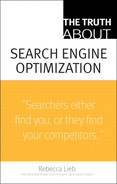PageRank is named not after how well a website page ranks, but rather after Google co-founder Larry Page. More important, though, PageRank is one of what Google claims are “over 200 signals” its search technology uses to determine the importance, and hence the ranking, of a given web page for a given search term.
Here’s how Google describes PageRank:
"PageRank reflects our view of the
importance of web pages by considering
more than 500 million variables and
2 billion terms. Pages that we believe are
important pages receive a higher PageRank
and are more likely to appear at the top
of the search results.
PageRank also considers the importance
of each page that casts a vote, as votes
from some pages are considered to have
greater value, thus giving the linked
page greater value. We have always taken
a pragmatic approach to help improve
search quality and create useful products,
and our technology uses the collective
intelligence of the web to determine a
page's importance."
Because anyone can download and install a free browser toolbar from Google that displays the PageRank of any page on any site on the Web (on a scale of 1 to 10), many search engine optimizers live and die by that magic number and little green display bar.
Should they? Does PageRank really matter in SEO?
Sort of. Early on in the history of both Google and SEO, it mattered a lot. But PageRank is no longer the be-all, end-all criterion of whether a search optimization endeavor is effective.
For starters, Google has publicly stated that PageRank values are updated only about once every three months or so. Therefore, the value display on that little green meter is historical, not real-time information. It’s also important to bear in mind that the PageRank tool indicates a range—not an exact number—in the “points” it accords a given web page. Even Google reps have stated that PageRank is “for entertainment purposes only,” and given the assurances of SEO strategists that the little green bar displayed in the browser toolbar is not the same PageRank value Google uses in real time to determine search rankings.
Google’s own GoogleGuide.com, in discussing how to boost PageRank, enumerates a variety of suggestions that mirror the most basic tenets of SEO: Build links, publicize your site, publish RSS feeds, and submit the site to directories and other online listing services. You’re doing all that stuff anyway, and you’re regularly checking your progress by searching for your site and its associated keywords and phrases on Google, as well as the other search engines. So essentially, PageRank is just one more light on the dashboard, and hardly the most significant one.
Many webmasters and SEOs have long considered PageRank to be the be-all and end-all indicator of whether they should buy a link from another website. The thinking goes like this: The higher the PageRank, the more valuable the link—and the higher the price for buying that link.
Logical, right? Not so fast. Mike Grehan, one of the most respected names in SEO, calls the very notion “ridiculous.”
“It’s just buying into the myth. A link from a popular and well-visited website can be invaluable if it sends you qualified traffic that converts,” Grehan says. “The true value of a link has absolutely nothing whatsoever to do with PageRank.”
Don’t allow PageRank to become a crutch, or a substitute for more serious SEO initiatives. Sure, it’s easy to be seduced by that omnipresent little green bar that rates every web page displayed in your browser. But today, the most seasoned and experienced SEOs don’t even have the feature installed. They know it’s more of a distraction than a measure of reality.
